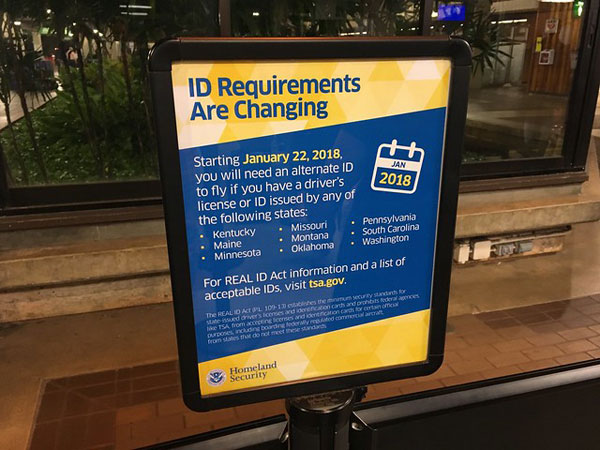
May 6, 2019, Civil Beat
If you’ve renewed your driver’s license recently, you are likely aware that new requirements for a federally recognized REAL ID make the process more complicated, requiring more items to prove your citizenship, residency, and so on. If you are a Micronesian living in Hawaii, it turns out you can’t get a federally recognized driver’s license at all.
Civil Beat reporter Anita Hofschneider explains that local resident Charity Joel, a Micronesian who has lived in Hawaii for 19 years, found herself in this predicament when she took the day off from work to renew her license.
According to guidance from the US Department of Homeland Security, non-US citizens must present visas or employment authorization documents to receive driver’s licenses or state IDs compliant with REAL ID. But there’s a hitch: Micronesians are legally entitled to migrate to the US under the Compact of Free Association without these documents. COFA gives the US military access to one million square miles of the Pacific, and in exchange allows residents of the Marshall Islands, Palau, and the Federated States of Micronesia, the ability to live and work in the US. About 20,000 Micronesians live in the state of Hawaii.
Tatjana Johnson, managing attorney at the Legal Aid Society of Hawaii, told Hofschneider, “It’s crazy because there is no visa, so why are you asking for it? It just doesn’t apply.”
According to Civil Beat, citizens of COFA nations can apply for employment authorization documents without paying fees, but it can take up to six months to get these documents. In the meantime, people who work at the airport or in other jobs that require a federally approved ID could lose their jobs, says Johnson.
The REAL ID law, which originally failed to include COFA citizens, was amended in December 2018 to ensure these legal residents could get federally approved driver’s licenses. But Senator Maize Hirono (D-HI) expressed concern that Homeland Security is misinterpreting the amendment. She told Civil Beat:
Sign up for our free newsletters
Subscribe to NPQ's newsletters to have our top stories delivered directly to your inbox.
By signing up, you agree to our privacy policy and terms of use, and to receive messages from NPQ and our partners.
I am concerned that the Trump administration is ignoring the spirit of the law and making it unnecessarily difficult for COFA citizens to get the IDs and driver’s licenses they need to live and work in this country. Everyone deserves equitable access to identification, and I will continue to explore all avenues to force the administration to comply with the letter and intent of the law.
Spokeswoman for the Hawaii Department of Transportation Shelly Kunishige expressed sympathy but claimed that the state had to follow federal policies. According to Kunishige, the state only learned of the new requirements in April.
Sheri Kajiwara, director of the Honolulu Department of Customer Services, told Civil Beat that COFA citizens could get limited-purpose driver’s licenses, the same licenses issued to undocumented citizens. But no one offered this option to Charity Joel when she applied for her license.
For those who don’t drive, the hurdle is even higher. A law that would have given COFA residents access to limited-purpose state IDs failed to pass the legislature this year. That leaves no options for a legal ID for non-drivers.
Advocates for the Micronesian community in Hawaii see this latest barrier to full participation in civic life as one more example of the institutional discrimination they face. Nearly half of the Marshallese in Hawaii live in poverty, and due to the 1996 Welfare Reform Act, Micronesians cannot access most public benefits, including Medicaid. The result is they cannot access the medical care they need, and many live in substandard housing or on the streets.
Johnson, the Legal Aid attorney, blamed the current situation on the state, which in her opinion should not have accepted new rules “at odds with both federal law and legislative intent.” She told Civil Beat, “People had no warning or ability to prepare for the new policy because the change happened with no public education.”
Dina Shek, a law professor at the University of Hawai‘i, said, “I’m especially upset that our Hawaii administrators and leaders would choose to take such a narrow view and create these roadblocks for our community members who have lived here for decades. Hawaii should know better. We should know better.”—Karen Kahn













